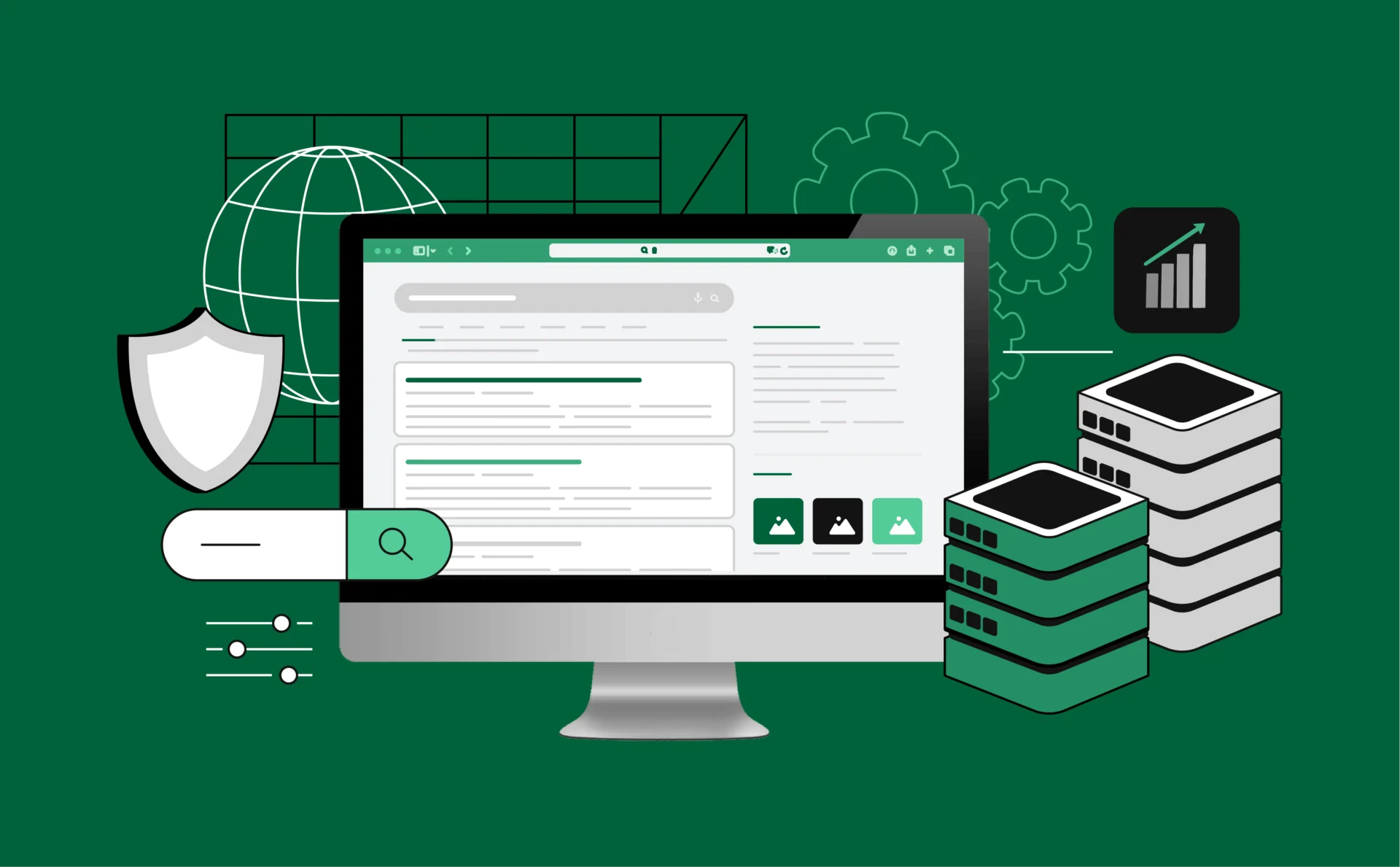
5 Best SEO Proxies for Accurate SERP Tracking
Running SEO at scale often means scraping search results, tracking rankings, and checking competitors across locations. Search engines don’t make this easy—they block repeated requests, trigger CAPTCHAs, and show you limited data. An SEO proxy solves this by giving you fresh IP addresses, letting you gather accurate results without getting blocked.
In this guide, you’ll find the 5 best SEO proxies in 2026. These services are reliable, fast, and built for SERP tracking. If you need keyword data from different regions or want to run audits without interruptions, the right proxy will keep your SEO work consistent and accurate.
1. NodeMaven
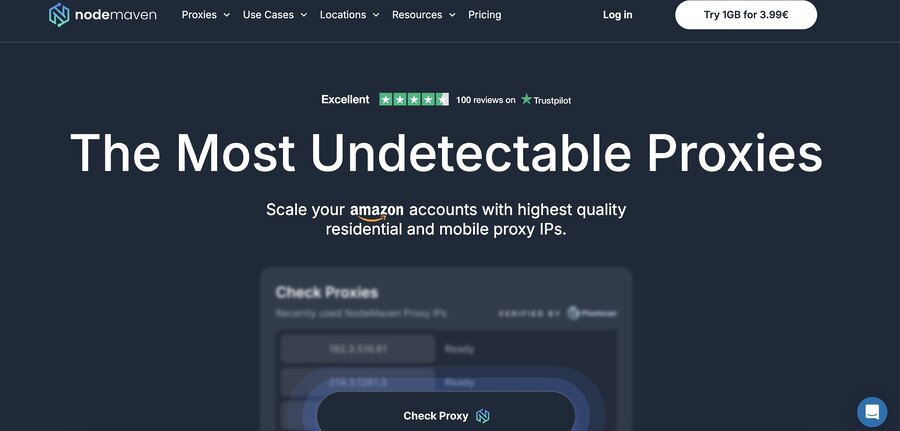
NodeMaven provides residential proxies with coverage in over 150 countries and 1,400 cities. The network is built from vetted sources and filtered with an internal system that removes low-quality IPs, resulting in about 95% clean addresses. This makes it stable for SEO tasks such as SERP scraping, competitor tracking, link checking, and localized audits.
The platform supports long sticky sessions of up to 24 hours, which is useful when monitoring rankings or collecting data from the same region without constant rotation. It also includes bandwidth rollover, so unused traffic is not lost between periods. Users can manage proxies through a simple dashboard and get live help from multiple support channels at any time.
Features:
- Residential pool in 150+ countries and 1,400+ cities
- Filtering system delivers 95% clean IPs
- Sticky sessions up to 24 hours
- Bandwidth rollover for unused traffic
- Real-time support, available 24/7
2. Decodo
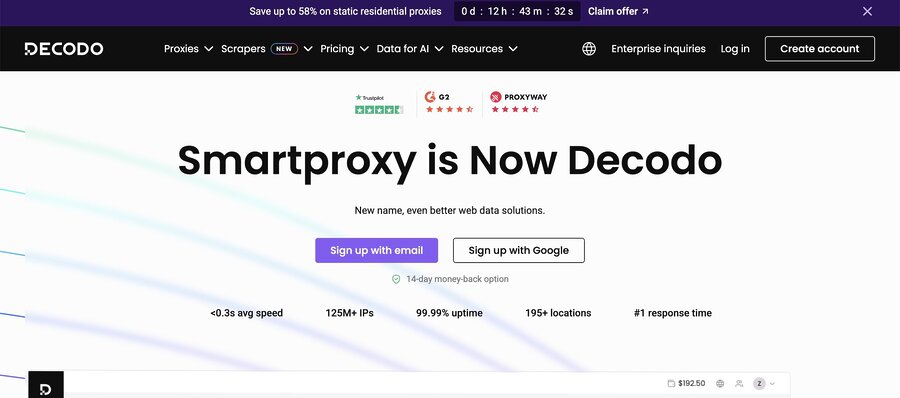
Decodo provides both rotating and static residential proxies with wide location coverage. The network includes millions of IPs from real devices, giving users access to reliable addresses for SEO tasks such as SERP scraping, localized rank tracking, and link verification. Geo-targeting is available at the country, state, and city levels, allowing precise collection of search data from specific markets.
The service supports flexible session control, with options for quick rotations or longer sticky connections when stability is required. A SERP scraper API is included, which helps automate large-scale keyword tracking and competitor research. The infrastructure is designed for low-latency requests, keeping response times below half a second even under heavy loads.
Features:
- Country, state, and city-level targeting
- SERP scraper API for automation
- Average response below 0.5 seconds
- IPs sourced from major ISPs
- Unlimited parallel threads supported
3. SOAX
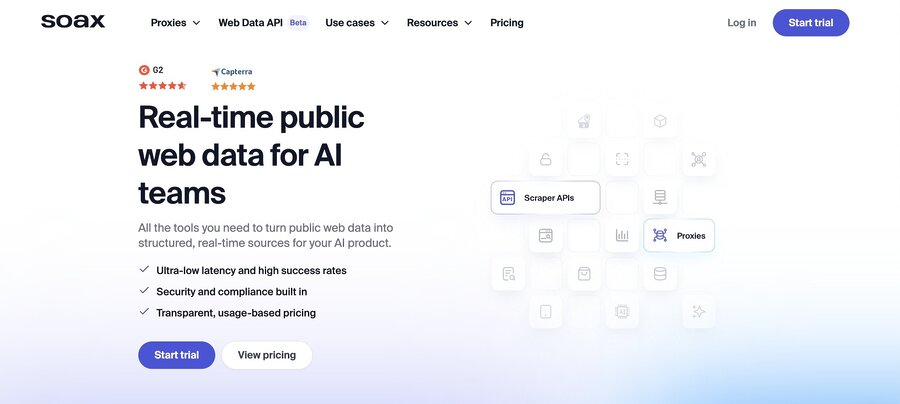
SOAX runs a proxy network with residential and mobile IPs in more than 100 countries. The pool has around 120 million residential addresses and 30 million mobile addresses across 3G, 4G, and 5G connections. These IPs are used for tasks like SERP checks, backlink audits, and keyword data collection.
Users can target by country, city, or ASN. Rotation is available per request or at fixed intervals between 90 and 600 seconds. The dashboard displays live IP availability, and an API is provided for SERP scraping and integration with SEO tools.
Features:
- Coverage in 100+ countries
- Access to 30M+ mobile IPs (3G, 4G, 5G)
- Rotation per request or custom intervals (90–600 sec)
- SERP scraper API included
- Real-time IP availability dashboard
4. Infatica
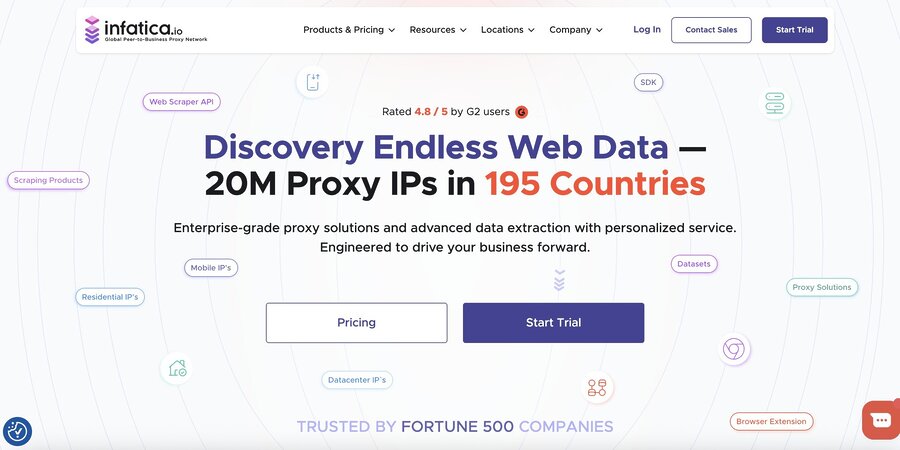
Infatica operates a global residential proxy network designed for high-volume SEO tasks. The pool contains more than 15 million IPs refreshed monthly, with coverage across most regions and cities. Targeting includes country, city, region, and ASN, which allows precise rank tracking and localized SERP checks.
The platform supports both rotating and sticky sessions. Rotation can be set per request or at intervals from 5 to 60 minutes. Each proxy list includes 1,000 ports, and users can generate unlimited lists under custom plans. Bandwidth is non-expiring, making it possible to carry unused data forward. Infatica also offers an API for automated keyword scraping, rank monitoring, and integration with SEO tools.
Features:
- Residential pool with worldwide coverage
- Country, city, and ASN-level targeting
- API for SERP and keyword data
- Proxy lists with 1,000 ports each
- Non-expiring bandwidth options
5. Bright Data
Bright Data runs a proxy network with more than 72 million IPs in 195 countries. The pool covers residential, mobile, ISP, and datacenter addresses. Both HTTP(S) and SOCKS5 protocols are supported. Rotation can be set by second, minute, or hour.
Targeting is available by country, city, ZIP code, and ASN. A Proxy Manager is included for IP allocation and session handling. APIs are provided for SERP scraping and integration. The service operates under GDPR and CCPA rules.
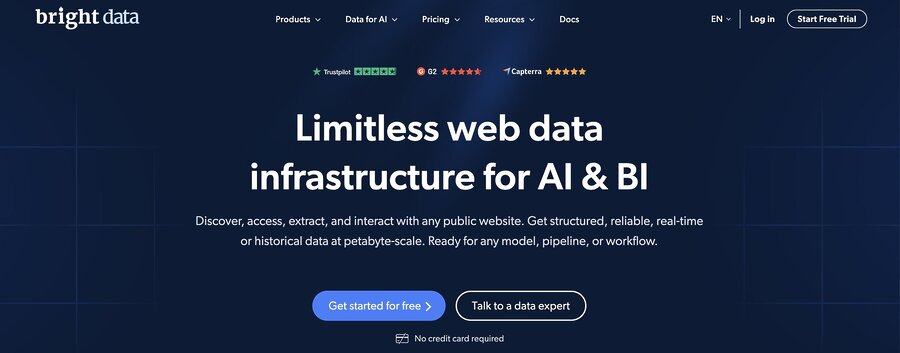
Features:
- 72M+ IPs covering 195 countries
- Targeting by country, city, ZIP, and ASN
- Rotation adjustable by second, minute, or hour
- Proxy Manager and API for integration
- GDPR and CCPA compliant
Why should you use SEO proxies?
Search engines block repeated requests, limit data by location, and trigger CAPTCHAs. Without proxies, rank tracking and large-scale scraping become unreliable. An SEO proxy service rotates IPs so you can keep collecting data without interruptions.
Main uses:
- Bypass restrictions – rotate IPs to avoid bans and keep scraping active.
- Accurate SERP tracking – check rankings and competitor results from any location.
- Reduce CAPTCHAs – residential and ISP proxies act like real users.
- Run automation – use scrapers, crawlers, and SEO tools at scale.
- Better scraping success – more stable when pulling titles, snippets, and rankings.
- Link building checks – verify backlinks and monitor competitor domains.
- Ad verification – confirm placements and test PPC campaigns in different regions.
- Other uses – affiliate tracking, localized testing, and market research.
The best SEO proxies: types and key factors
Not every proxy works the same. The best SEO proxies depend on the task and budget.
Datacenter SEO proxies
Cheap and fast. Good for light SEO work like audits and tests. Easy to detect, not reliable for heavy SERP scraping.
Residential SEO proxies
IPs from real devices. Harder to block, better for rank tracking and local SEO. More expensive when scraping at scale.
ISP SEO proxies
IPs issued by ISPs. Combine datacenter speed with residential trust. Hold long sessions for continuous rank checks. Limited supply and usually higher cost.
Key factors in choosing an SEO proxy service
- IP pool size – larger pools lower detection rates.
- Location coverage – needed for local SEO and geo-specific tracking.
- Rotation options – per request or timed sessions.
- Speed and success rate – fast proxies complete more tasks per run.
- Support – 24/7 help is useful when running high-volume jobs.
FAQs
What is an SEO proxy?
An SEO proxy is an IP address used to collect search engine data without being blocked. It helps with SERP tracking, keyword research, and competitor analysis by rotating IPs and hiding your real address.
Why should I use an SEO proxy service?
A reliable SEO proxy service prevents IP bans, reduces CAPTCHAs, and allows you to gather accurate ranking data from different locations. It makes large-scale scraping and automated SEO tools possible.
Which type of proxy is best for SEO?
The best SEO proxies are usually residential or ISP proxies. They look like real users and work well for rank tracking and local SEO. Datacenter proxies are cheaper but easier for search engines to block.
Can SEO proxies improve local keyword tracking?
Yes. With seo proxies, you can target by country, city, or even ZIP code. This lets you see how rankings and ads appear in different regions, which is important for local SEO.
Are SEO proxies only for scraping Google?
No. While many use them for Google SERPs, seo proxies also help with Bing, Yahoo, and other engines. They are also used for link building, ad verification, and market research.
Conclusion
The best choice depends on what you’re running. For local SERP tracking and competitor analysis, residential or ISP proxies are most reliable. For lighter SEO tasks, datacenter proxies may be enough. A strong SEO proxy service will give you rotation options, wide geo-targeting, and stable performance so your campaigns stay accurate and uninterrupted.